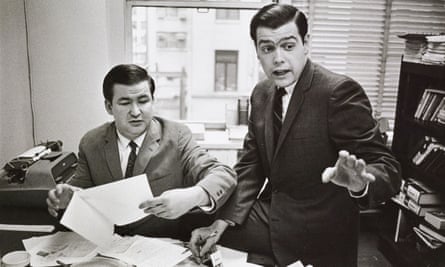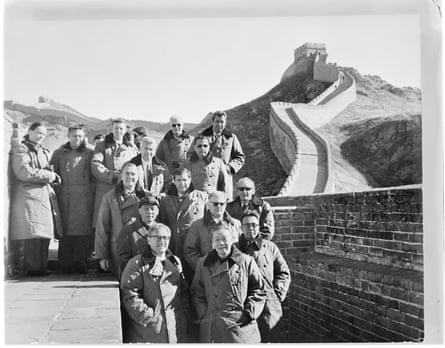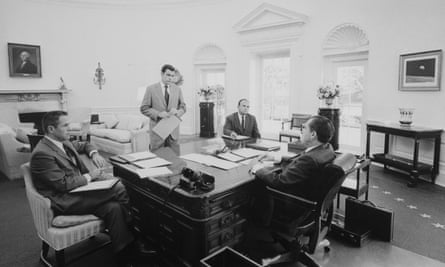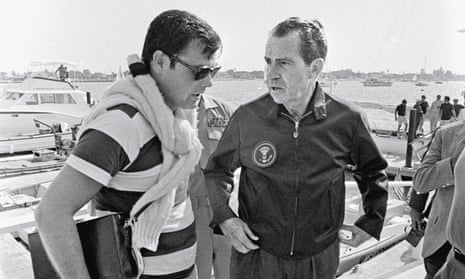He was at the side of the American president on one of the most important diplomatic trips in history, enjoying sumptuous banquets as a guest of Chinese dictator Mao Zedong.
Three and a half years later he was in prison after becoming first person to go on trial in the aftermath of the Watergate scandal, despite protesting his innocence.
But half a century on, Dwight Chapin is not bitter and does not blame Richard Nixon for his fall from grace. On the contrary, he believes that the jowly-faced 37th president – who resigned in shame in 1974 – was a brilliant man and is still misunderstood.
“Richard Nixon was not a crook,” says Chapin via Zoom from his home in Riverside, Connecticut. “Sometimes the term ‘evil’ is used: that’s not what the man was about. In his heart, he was not only a patriot but an incredible public servant. He was in the arena serving the public for half a century.”
Challenging baked-in perceptions of Nixon was the main motivation for Chapin, now 81, to write a memoir, The President’s Man, which delves into the thousands of hours they spent together, from small hotels in New Hampshire to the Forbidden City in Beijing.
They first met in 1962 when Chapin was a 21-year-old student and Nixon – narrowly defeated for the presidency by John F Kennedy two years earlier – was running for governor of California.
Chapin recalls: “Mr Nixon had been a congressman, a senator, vice-president for eight years and then had all that notoriety running against Kennedy, so he was a commanding figure. When he was in a room, you knew it. His presence was very strong.”
He worked as a field organiser on the 1962 campaign then as Nixon’s personal aide during his successful run for president in 1968. At the White House he was appointments secretary, with a door that opened into the Oval Office, and deputy assistant to the president, responsible for the planning and logistics of his public appearances.

But he does not claim to have been Nixon’s friend. “I knew him so well; but as I have continued to discover through the decades, in many ways I barely knew him at all,” Chapin writes wistfully.
Despite his relative youth he served as acting chief of protocol when, 50 years ago this week, Nixon became the first US president to visit China. It was a leap into the cold war unknown: China was closed to the west and the US refused to recognise its communist government.
The Washington Post newspaper wrote in an editorial at the time: “If Mr Nixon had revealed he was going to the moon he could not have flabbergasted his world audience more. It is very nearly mind blowing.”
Such was the cultural impact that it inspired an opera by John Adams. Chapin reflects: “History should remember the trip as the single most significant and dramatic foreign journey by any American president ever. The world stood still while Nixon went to China.”
He writes that Nixon relished the meeting of adversaries as a unique opportunity to demonstrate diplomatic and strategic expertise. “He loved planning this trip. Loved it … Here was Richard Nixon, the leader of the free world, marching off to the darkest, and most mysterious, part of the Communist empire.”
Nixon was accompanied by three Americans, including national security adviser Henry Kissinger, during his meetings with Chairman Mao, while Chapin and the rest of the delegation remained at a guest house. “When he got back, the president reported to us that it had gone well,” he recalls. “I would use the word elated.”
Not that Chapin had time to be bored. He writes: “The banquets kept coming. At each banquet there were toasts and more toasts and toasts of the toasts. Between banquets there were meetings and tours. Six months earlier I had known nothing about the Forbidden City. At this point, if it had been necessary, I could have conducted a tour myself.”
At a banquet in Shanghai, Nixon offered a toast that he had scribbled on one of his yellow legal-sized notepad in his suite, declaring: “This trip was the week that changed the world.”

Chapin writes: “In retrospect, yes, it was ‘the week that changed the world’, but as Chairman Mao had proclaimed, ‘A single spark can start a prairie fire’. What a prairie fire of aggressiveness, influence, and trade, reaching around the world, was ignited by that week fifty years ago.
“Looking back I have a special appreciation for Nixon’s prophetic prediction that ‘Within fifty years, the United States and China will be adversaries, and we need to be able to talk with one another.’”
But today the wisdom of Nixon’s outreach is questioned. China’s rise as a global power has become a defining principle of Joe Biden’s presidency as he warns of a struggle for the 21st century between autocracy and democracy, rival systems competing to show which can better deliver for its people.
The communication channel with President Xi Jinping, China’s most powerful leader since Mao, remains open but relations are strained. China is flexing military muscles and threatening Taiwan. The US staged a diplomatic boycott of the Beijing Winter Olympics over human rights abuses.
Chapin reflects: “Any official American involvement there is missing and you have the the Russians and the Chinese together. I think Nixon would have been handling that differently. Nixon would be thinking of this in a very strategic sense. He would be wanting to do anything besides having a war or conflict and he would be looking for diplomatic answers.”
But just four months after the historic China trip, the seeds of Nixon’s – and Chapin’s – downfall were sown.
A break-in at the Democratic National Committee headquarters in the Watergate office complex in Washington, which involved wiretapping phones and stealing documents, was traced to officials at Nixon’s re-election campaign committee. Although the president comfortably won re-election later that year, White House attempts to conceal the scandal began to unravel.
A key whistleblower was Mark Felt, a senior FBI official who secretly fed information to Washington Post reporters Bob Woodward and Carl Bernstein. Felt was immortalised as “Deep Throat” by their book All the President’s Men, which became a Hollywood film. But five decades later, he is no hero to Chapin.

“It’s disgraceful that the number two man at the FBI is leaking material regarding an investigation,” he says, evidently still rankled. “I met with the FBI and I told them the truth and I told them everything and two days later it’s on the front page of the Washington Post because Mark Felt got the report and leaked it.
“I have nothing but disdain for somebody that took an oath to the constitution to follow the rules of the land. This leaking by FBI is so outrageous and goes way back into the J Edgar Hoover days. Part of the culture of the old FBI was leaking stuff and I happen to feel that’s wrong. Mark Felt is a real sleazebag and a disgrace to the FBI.”
Chapin acknowledges that Nixon “made mistakes” and the White House did not “come clean” early. But he argues this was because the president had not been told exactly what happened or why. “He was treating it like a public relations problem.”
As the walls closed in, Chapin was among several staff who, in December 1972, learned that they would be fired. “My eyes welled with tears,” he writes of a decision he found profoundly unfair. “Everyone was expendable. But me? Processing what I had been told was very painful.”
Announcing the shake-up two months later, Nixon declared: “There can be no whitewash at the White House.” But despite further purges, there was no escape. A drip-drip of damaging headlines led to high-profile congressional hearings and bombshell testimonies.
The courts forced Nixon to surrender tape recordings that confirmed he had tried to use the CIA to divert the FBI investigation – an abuse of presidential power and an obstruction of justice. The “law and order” president had behaved as if he was above the law.
Nixon lost the confidence of fellow Republicans and in August 1974, facing almost certain impeachment, became the first and still only US president to resign.
Chapin maintains his own innocence, insisting that he had nothing to do with the break-in or cover-up. But his earlier decision to hire an old university friend, Don Segretti, a political dirty trickster who would eventually serve four months in prison, was his undoing.
Chapin was indicted on four counts of making false statements to a grand jury, charges that he still adamantly denies. He was found guilty on two counts and spent nine months in a low security federal prison in California.
“I was fortunate that I could go to a minimal security place so there were no cells, no doors that slammed,” he recalls. “There was more of an army barracks type situation. Now, I’m not saying it was pleasant because you’re losing your freedom and I was being punished. I always viewed this as a political thing, not that I was a criminal.”

Two or three weeks in, Chapin got hassled by two younger inmates. He went to see an older inmate, “Big Mike”, who happened to be keenly interested in politics and used his influence to ensure that Chapin never got bullied again. “When he put out the word, nothing was going to happen to me.”
Chapin believes incarceration changed him and proved one of the most valuable learning experiences of his life. “When I was going off to prison, a friend said, ‘Dwight, it can get the best of you, or you can make the most of it.’ That was a wonderful piece of advice. I kept myself very busy. I read constantly.
“I was probably in better physical shape than ever in my life. I started a programme for other prisoners that were getting ready to go back out into society. I had a desk and a little office and I helped them write letters and find jobs they could go to. I tried to make myself productive there and that helped make the time go faster.”
But did he not feel abandoned and betrayed by Nixon, who was pardoned by his successor, Gerald Ford, and escaped criminal prosecution?
“He couldn’t help me out,” Chapin says. “Richard Nixon was president of the United States. He had to resign so he went through his own hell, different than mine, but equally traumatic, maybe even more traumatic than what I went through, particularly for such a proud man, such a good man.
“What he made it possible for me to witness and be a part of so outweighs any of the negatives of Watergate. I’m very proud of what we accomplished and I think he did a great job. There’s no question I was heartbroken, there’s no question I went through hell, but so did he.”
Some readers may find Chapin’s praise of Nixon hard to swallow and draw comparisons with the blind loyalty of former aides to another Republican president, Donald Trump. But Bernstein is among those who have observed that while Nixon was a crook, liar and media hater, Trump is infinitely worse: an authoritarian who staged an attempted coup.
Chapin, an admirer of Ronald Reagan who seems reluctant to talk about Trump, found his footing when he regained his freedom. He was a magazine publisher, held a senior position at a public relations company and managed his own consulting firm. He has put his prison time behind him and, at 81, written his first book so his children and grandchildren can understand his version of history.
“Things happen to people all the time and it’s important that individuals realise that their life is not over,” Chapin reflects. “Time is a great healer, and I try to make the point in my book that I was able to recoup from this.
“I was happy it happened to me as a young man and not like with some of the older guys where it was the capstone of their career. For me, it was at the start of my working life and I’ve been able to do many other interesting things with my life since then.”
The President’s Man is out now
